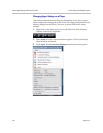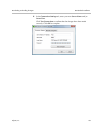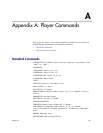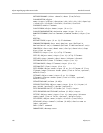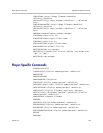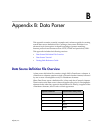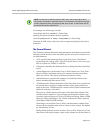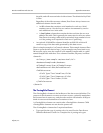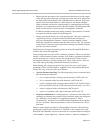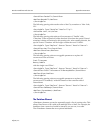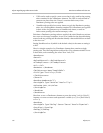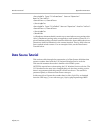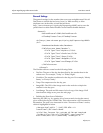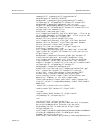
Polycom Digital Signage Administrator Guide Data Source Definition File Overview
172 Polycom, Inc.
For example, the following is invalid:
<StartTag>"Hello & Goodbye"</StartTag>
Instead, the special characters must be replaced:
<StartTag>"Hello & Goodbye"</StartTag>
Note that all XML entity codes start with an ampersand (&) and end with a
semicolon.
The General Element
The <General> element defines the basic parameters of the data source and the
table into which the data source should be parsed. <General> contains five or
six child elements:
• <Url> specifies the Internet location of the data source. Data Parser
suports http, file, and ftp URLs. The URL should resolve into a text type,
such as a plain text, HTML or XML file.
• <Database> identifies the database file into which parsed data should be
saved.
• <AllowDuplicates> can be either True or False. When set to True, Data
Parser will allow duplicate entries to be created from the parsed data.
When set to False, Data Parser will discard duplicate entries.
• <RefreshInterval> specifies the number of seconds Data Parser waits
before reloading the data source's URL.
• <TableStructure> defines the schema of the data table to be created from
the parsed data. It requires a single attribute, Name, that specifies the
name of the table. <TableStructure> contains child <Field> elements that
define the columns of the table.\
The value of a field element is the name of the data table column. Each
<Field> element requires a Type attribute specifying the column's type.
Currently supported types are Text (a 255 character string), Memo (a 2048
character string), and Integer. The <Field> element also allows optional
AllowEmpty and KeyField attribute.
AllowEmpty can be either True or False, and determines whether Data
Parser will accept table entries with no value for this column. The default
for AllowEmpty is True.
The KeyField attribute can also be either True or False. When set to True,
Data Parser will require unique values in this column for all the entries in
NOTE: As data source definition files are XML code, care must be taken when
using certain characters in parameter values. The characters in the table at the right
must be replaced by their corresponding XML entity codes, or Data Parser will fail
to load the data source definition file.



